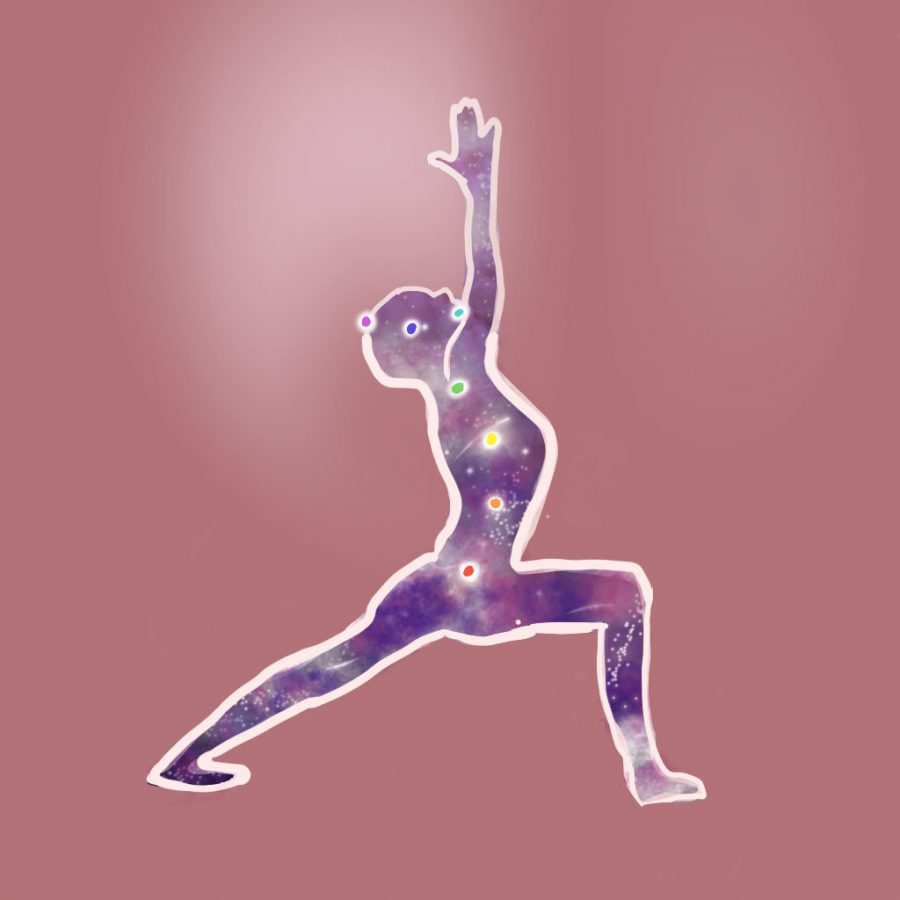Special Section: Mindfulness and yoga used as a form of therapy
April 23, 2019
For some, mindfulness practices such as yoga, meditation and tai chi is a form of stress release which helps them stay in control of their mental health.
According to theatre professor Scott Stroot, yoga is an ancient Hindu practice based on energy centers known as chakras that lie throughout the body, similar to the Chinese idea of qigong or the manipulation of qi. Both practices centralize around the idea of energy bodies.
Stroot has practiced tai chi for nearly 30 years and said he moves through the world differently.
“One of the things that attracted me to tai chi in the first place was that I knew and understood the value of meditation when I was younger,” Stroot said. “I was one of those people who had a very hard time sitting still, I would constantly get bored.”
Stroot said because tai chi was physical, the additional things he had to focus on throughout his practice helped him reach a meditative state of mindfulness and defined tai chi as a series of slow-moving postures with different hand gestures all connected to the body and the breath and the upkeep of a relaxed state of alertness.
“Essentially, it is a very slow, meditative form of a martial art,” Stroot said.
Stroot explained that there were hard and soft styles of martial arts and that in soft styles such as tai chi, the focus is on controlling what Stroot referred to as “monkey mind” by controlling the breath and the body.
He also explained that the lifeforce, or qi, is a vital part in these practices and is based on the same conceptual foundation that underlines all of acupuncture, all herbal medicine and massage therapy in Chinese medical philosophy — balancing a person’s qi.
“Knowing how to properly build up the right amount of qi and have it circulating appropriately and freely through your body is an important part of tai chi,” Stroot said.
Stroot said that he teaches tai chi to help students with performance anxiety. He said research has proven that training your mind to let things go and being mindful and relaxed can have long-term benefits for reducing depression and anxiety.
“Of course, it doesn’t work in every case, but neither do medications or talk therapy,” Stroot said.
Lacretia Dye, an associate professor in the Department of Counseling and Student Affairs, teaches Soul Yoga at the Preston Center in her spare time. She also spoke about research regarding the practice.
“Research has shown time and time again how mindfulness and meditation or yoga practices can lower the stress response in the brain,” Dye said.
Dye said one of the benefits of yoga is that it boosts serotonin levels, and the practice lowers the stress response in the brain and lowers the cortisol levels.
“Serotonin and oxytocin are both really good hormones that we like to have shots of through our bodies,” Dye said.
The systems of the human body are often at the back of her mind when practicing yoga.
“Yoga, being able to connect the breath with the movement, it’s like taking care of all those systems through the things you do,” Dye said.
Dye spoke about releasing the undesirable emotions in our bodies and also creating new space to get to some things you might not be paying attention to.
“Sometimes, however, our bodies are feeling, our emotions will go there too and vice versa,” Dye said.
A lot of times, Dye said anxiety is caused by our thinking about things we need to get done, stuff that happened in the past or things we are worried about happening in the future.
She added that mindfulness is a form of yoga, and breathing is a component of yoga that brings people into the moment and encourages them to be present.
“Think about how stress-free it can be if you’re just thinking about being here now instead of thinking of things that need to get done, things that get your heart rate to speed up,” Dye said.
Dye considered being aware of emotions and being able to notice where people feel the emotions in their bodies to be the most important facet of the practice of yoga.
“When you check in to see what’s going on with yourself, you’ll find that there’s already answers,” Dye said.
She also said she believes there’s so much noise, so many distractions around that people often forget to pay attention to what their bodies are telling them, opting to ignore the advice in favor of taking a pain reliever.
Instead of going and taking some pain pills and shoving the message away, Dye said she will sit still in meditation and breath through it.
“When I have aches and pains in my body, it’s my body sending me a little love, not to say, ‘Hey, you need to slow down,’” Dye said.
Dye said taking a slow, full breath can help people feel more calm. At the end of her yoga practice, there are those same benefits.
“I may come to my mat with something on my mind, go through my practice and then feel at peace or have answers that I didn’t have,” Dye said.
News reporter Abbigail Nutter can be reached at 270-745-6011 and [email protected] her on Twitter at @abbeynutter.













